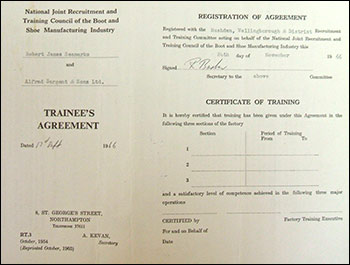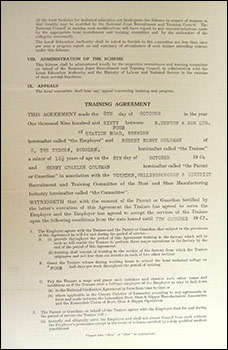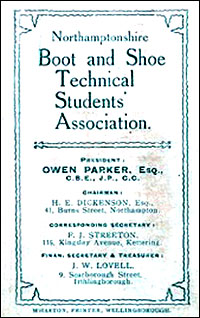|
|||||||
| Article by Sue Comont based on documents in Northampton Museum |
|||||||
|
Rushden Boot and Shoe School Training Agreement
|
|||||||
|
|||||||
|
|||||||
|
In the 1950's and 1960's a scheme known as RT3, for the training of selected personnel in the boot and shoe manufacturing industry, was in force in Rushden. The scheme was administered by the National Joint Recruitment and Training Council of the Boot and Shoe Manufacturing Industry in conjunction with the Local Education Authority and the Ministry of Labour and National service, and its purpose was to provide intensive planned training for a limited number of selected personnel in the industry. Trainees were to be recommended by their employers. While young men were required to do National Service, trainees were to be accepted onto the scheme up to their 17th birthday, or within 3 months of leaving school. Once National Service was abolished, trainees could be accepted at the age of 16 with no maximum age limit. The training was to last three complete academic years, subject to a review at the end of the first year. A written agreement incorporating the provisions of the scheme was to be made between the employer and each trainee, and registered with the local recruitment and training committee. Trainees received pay according to the rates agreed by the National Conference. The scheme of training was divided into two. Half took place in the factory and the other at the college. Training in the factory was to lead to the trainee, at the end of his three years of training, being able to perform three major operations. The three year period was to consist of training in the department in which the trainee was based, and not less than six months in each of two other sections of the factory or in three sections of one department, as long as that work fell into well defined sections. Where the facilities in the employer’s factory were not sufficient to give the trainee the full range of departmental training, arrangements were to be made for part of the training to take place in another factory. The progress in the factory of each trainee was to be reported by the employer twice a year to the local training and recruitment committee and at the end of the training, the certificate on the back of the training agreement was to be signed for and on behalf of the employer. The trainee was to be released by the employer during working hours to attend the local technical college on three or four half days a week for a period of three academic years. Trainees could also take advantage of evening classes at the college if such facilities existed. The trainee’s studies were to cover general shoe technological subjects, together with some further general educational subjects and were designed to lead to nationally recognised exams in boot and shoe manufacture. Trainees were normally expected to take the Advanced Certificate in Boot and Shoe Manufacture of the City and Guilds of London Institute by the end of their third year. The Local Education Authority was to furnish the local training and recruitment committee with a report on the progress and attendances of each trainee at least once a year. The agreement gave the date and the names of the parties involved, including the parent or guardian of the trainee.
This one is dated
The agreement could be dissolved on certain conditions. If the employer or the technical college reported that the trainee had not made sufficient progress in his factory training or his college work, then the agreement could be ended. If the trainee damaged or destroyed any property of the employer or college, or if he stole from them, or was guilty of misconduct or persistent inattention, he could be dismissed. The agreement also came to an end if the employer did not observe his obligations, or if he went out of business. The agreement ended with the signatures of the three parties. |
|||||||



